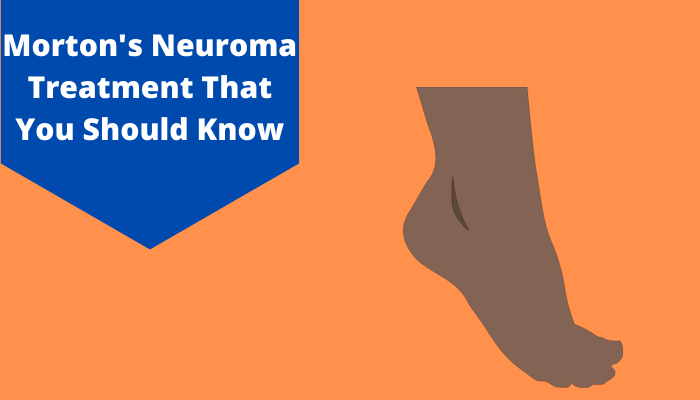Morton's neuroma is an agonizing condition that primarily happens on the balls of your foot (mainly the area between your third and fourth toes). Under this medical condition, you may feel that you are standing on a stone in your shoe or on a folded sock. The initial Morton’s neuroma treatment methods are medications, injections and custom orthotics. In some conditions, surgeries are recommended.
Let us read more about Morton’s Neuroma and its treatment options.
What is Morton’s Neuroma?
Morton’s neuroma is a condition that targets your forefoot or ball of your foot. This is also called intermetatarsal neuroma. In this condition, the nerves in your toes may get inflamed or swollen. A neuroma can give you agonizing pain and you may feel difficulties in walking.You should opt for proper Morton’s neuroma treatment because without the treatment the neuroma gets bigger and may damage your nerve permanently.
Morton’s Neuroma Symptoms
You may not experience any observable symptoms at the beginning of Morton’s neuroma on your foot. Since it is not a tumor, hence you may not get any lump on your foot. Initially, you may get some pain but it starts slowly. In the initial phase, by removing your shoes or massaging your foot, you may get relief from the symptoms.Symptoms will get more prominent with time. These symptoms include:
- Sharp, tingling or burning pain between the toes, especially while walking or standing
- Inflammation between the toes
- Numbness in your feet
- You may feel a small pebble under the ball of your foot
- Pain will become severe if you wear high-heeled shoes or stand on the balls of your feet
Diagnosis
By pressing your foot during a physical exam, your doctor will try to feel a mass or tender spot.Imaging Tests to Detect Morton’s Neuroma
The following imaging tests are used in diagnosing Morton’s neuroma:- X-rays: Your doctor will recommend x-rays of your foot to find out the causes of your pain such as a stress fracture.
- Ultrasound: This imaging technique uses sound waves to create real-time images of internal structures.
- Magnetic resonance imaging (MRI): This technique uses a strong magnetic field and radioactive waves to visualize soft tissues. This is a costly test and may indicate neuromas in people who have no symptoms.
Morton’s Neuroma Treatment
Based on the severity of the disease, you need to opt for the right treatment method for your neuroma.Treatment Procedures
Listed below are the treatment options for Morton’s Neuroma:1. Injections
- Steroid injections into the painful area
- Alcohol sclerosing injections (alcohol solution is injected to alleviate the nerve pain)
- Non-steroidal anti-inflammatory drugs (NSAIDs) like ibuprofen or aspirin can be prescribed orally
- Anti-inflammatory drugs may be injected into the skin
- Local anesthetic injection to numb the nerve and combat pain
2. Decompression Surgery
Sometimes, the expert surgeons release the pressure on the nerve by cutting nearby structures like the ligament that fasten with some of the bones in the front of the foot. Surgeons often use extreme cold before the operation or as a stand-alone treatment to alleviate their pain. This therapy is called cryogenic neuroablation which is beneficial in reducing the symptoms. Treatment temperatures may go below 94 degrees below zero Fahrenheit.3. Removal of the Nerve
If other treatments are not effective, the surgical removal of the growth is recommended. Most surgeries are a successful treatment for Morton’s neuroma, but some may feel permanent numbness in the affected toe.Morton's Neuroma Treatment at Home
The below-mentioned steps will help you to manage your symptoms are home.- Wear Good Shoes: Pick up supportive shoes with a wide toe box. Shoes that come up with shock-absorbent soles and proper insoles could be beneficial for you. Never close the top of the shoe very firmly. Discard shoes that are tight and have pointed-toes or have heels more than 2 inches high.
- Use Shoe Pads: You may use over-the-counter shoe pads on your shoe to alleviate pressure
- Use an Ice Pack: Use an ice pack to reduce pain and inflammation
- Rest: Take rest and massage your feet. Don’t indulge yourself in sports activities that will cause a lot of pressure on your foot.
Who is more prone to getting Morton’s neuroma?
- Foot Shape: If you have flat feet, high arches or toes in an unusual position (by birth), you may face problems with your toe joints. This may lead to Morton’s neuroma.
- Certain Medical Conditions: certain foot conditions (bunions and hammertoes) may enhance your risk of developing Morton’s neuroma.
- Sports: people who are associated with sports activities like running, tennis and other racquet sports may feel a lot of pressure on their feet. Athletes are more prone to getting Morton’s neuroma.
- Shoe Choice: More than 2-inch-high heels will cause problems. So, avoid tight-fitting or pointed shoes.


